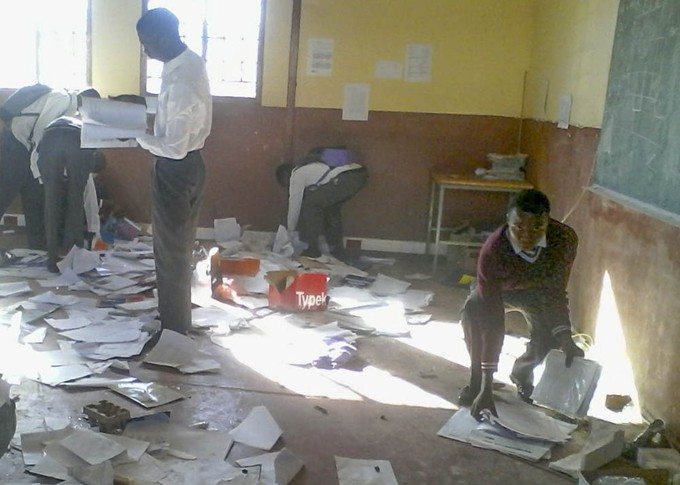
Students at Mhlanganisweni Technical and Commercial High School in Libode cleaning up after protests. Photo: supplied
2 September 2016
Three schools were burnt in Ngqeleni and Libode this week during protests against a shortage of teachers, bringing the number of schools burnt in the Eastern Cape to four in just in one month.
On Wednesday night Chief Henry Bokleni High School in Libode, 34 km from Mthatha, was set alight. Students were protesting against corporal punishment, and against demands for R250 from parents to pay teachers employed by the School Governing Body (SGB) to solve a teacher shortage. They also want the school to participate in more sports events in the district.
SGB chairperson Mandla Jali said he had been woken up on Wednesday night and told the school was burning.
“We managed to stop the fire and we are going to stay here for a while guarding the school,” he said. Grade 12 students were able to start their matric prelims with community members guarding them, Jali said.
He said a meeting had been held at the school between parents, teachers and students in an attempt to find solutions.
The burning of Chief Henry Bokleni High School comes after six classrooms, the principal’s office, an administration block, library and laboratory at Nogemane Senior Secondary School in Ngqeleni were set alight by students who were demanding a matric farewell party.
SGB member Jongimvula Hohlo said the school was planning to hold the event after the prelim exams.
A house rented by Sandi Senior Secondary School in Ntsudwana Village in Ngqeleni as well as a school hall were vandalised and set alight on Monday 29 August. Students were demanding more teachers. Five teachers, including the deputy principal, were fired in February by the SGB which held them responsible for the drop in the matric pass rate from 100% to 35% in the past few years.
Matric prelims were put on hold in both schools while parents, representatives of the Eastern Cape Department of Education, community leaders and representatives of the South African Democratic Teachers Union (Sadtu) discussed the problem of teacher shortages in the Libode District.
Equal Education (EE) and Sadtu have said the department should take responsibility for the crisis.
EE called on the department to investigate the shortage of teachers.
Deputy general secretary Ntuthuzo Ndzomo said EE did not condone the burning of schools. But the shortage of teachers was a crisis in the Eastern Cape, he said.
“We are very disappointed in the department for not taking this issue of a shortage of teachers very seriously. In some of these schools you find that pupils have been out of teachers since February,” he said. The department should have intervened long ago, said Ndzomo.
Other schools also faced a lack of teachers. Some of the teachers left because the department took too long to pay them, he said.
Sadtu EC spokesperson Sindisile Zamisa said the union had raised the issue with the department many times without success.
Zamisa agreed with Ndzomo about teachers not being paid. “It is a norm in this province for teachers not to be paid for more than five months, without anyone facing consequences. This is one thing we are not prepared to tolerate this time around,” he said.
Last month students in Libode near Port St Johns burned down classrooms and two storerooms and removed taps at Mhlanganisweni Technical and Commercial High School in protest at a shortage of teachers.
Students said that at a meeting last week with the Department of Education, parents and teachers, they were told to clean up the damage they had made before there would be any discussion about additional teachers. Grade 12 students were able to start their prelims but students from other grades said they did not know when they would return to school.